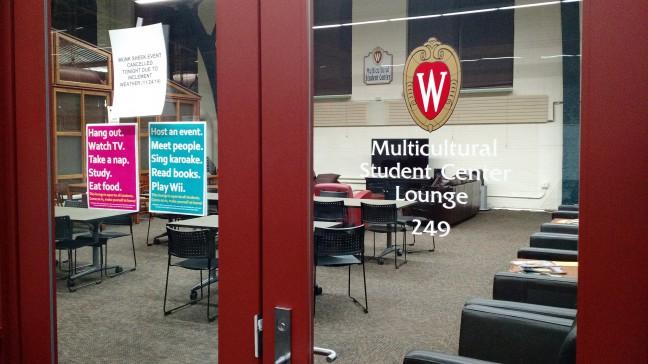University of Wisconsin students met to discuss current issues, respectability politics and minority groups in Multicultural Student Center’s monthly Steepin’ it Real event Wednesday.
Respectability politics take place when marginalized groups attempt to mold their own members to make them assimilate better into mainstream society, Danaan Yo, MSC programming graduate assistant, said. Rather than challenging mainstream society’s values for failing to accept differences, members of marginalized groups change themselves.
Yo asked students to talk about their own encounters with respectability politics. UW junior Malik Anderson said one incident involved his parents not allowing him to grow his hair because it would be perceived as unprofessional.
Dania Shoukfeh, another UW student, said the April 21 Library Mall demonstration to protest the arrest of Denzel McDonald sparked backlash on social media platforms like YikYak. People spoke against the protest, saying there were better, less disturbing ways — like writing a letter to UW Chancellor Rebecca Blank — to protest McDonald’s arrest.
But Shoukfeh said the backlash was an example of respectability politics because people did not want to deviate from mainstream society and seem “uncivilized” while protesting.
“People were saying, ‘Couldn’t you find a more civilized way to voice your opinion?’ But really it was respectability politics,” Shoukfeh said.
UW senior Sean Avery said respectability politics also made marginalized group members “feel small” and silenced them. He said among the black community, respectability politics was a way to be safe at a time when violence against community members was common. Assimilating to match mainstream society was helpful then, but he said this ideology was passed down and still maintains itself in society today.
#TheRealUW and lack of attention
Students at the event also discussed #TheRealUW and the impact that it had on campus. UW freshman Kaylin Langer said a lot of students felt the hashtag was “overdramatized.” She said these students pointed to alternative resources on campus where such matters could be discussed.
But she said discussing matters this way is not going to do anything to educate those who were unaware of why the hashtag existed or the current campus climate.
“We can talk among ourselves but if we can’t reach people who aren’t listening then we are talking in circles,” Langer said.
UW freshman Devon Betts said people on campus need to pay more attention to current events and speak up more about them. He said most people would not report on, or did not even know about, racial bias incidents, like the one against the First Wave scholar in Sellery Hall.
UW freshman CJ Zabat echoed Betts’ sentiments and said only a small percentage of students are speaking out about these issues, while others are criticizing. But he said those staying silent in these situations are not helping at all.
Not belonging on campus
Betts said lack of attention to minority students’ issues also made them feel like they did not belong at UW.
“There are some who don’t feel like Badgers,” Betts said. “Some people consider the school their family, but some don’t and there’s a divide there.”
Langer said many students whose parents also attended UW become blinded by their legacy. They consider UW to be such an important part of their identity that they tend to ignore its negative side and problems.
Betts said privilege went beyond white supremacy. He said students from sexual minority groups face “straight privilege,” which is something UW needs to work toward addressing as well.
Steepin’ it Real takes place every month and will resume in the fall 2016 semester.


